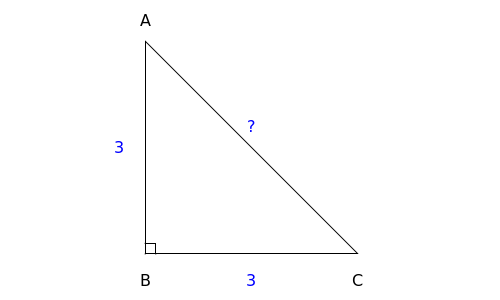Trigonometry: Angles with sine, cosine and tangent
 Rules for right-angled triangles
Rules for right-angled triangles
There is an important rule for right-angled triangles pertaining the ratio between the sides.
When it comes to the lengths of the sides of a right-angled triangle with a right angle #\orange C#, legs #\blue a# and #\green b# and hypotenuse (the longest side of a right-angled triangle) #\orange c#, the following rule applies:
\[\blue a^2+\green b^2=\orange c^2\]
We call this rule the Pythagorean theorem.
With this theorem, we can calculate the remaining side of a right-angled triangle of which we already know two sides.
For example, if we want to calculate the hypotenuse, we isolate #\orange c# in the Pythagorean theorem:
\[\orange c = \sqrt{\blue a ^2 + \green b^2}\]
In a right-angled triangle #ABC# with right angle #C# is #AB# the #\orange{\textbf{hypotenuse}}# and are #AC# and #BC# the legs of the triangle:
- #AC# is the #\green{\textbf{adjacent leg}}# of #\blue \alpha#
- #BC# is the #\blue{\textbf{opposite leg}}# of #\blue \alpha#
In addition to the ratio between the sides of a right-angled triangle, there are important relationships between the sides and angles of a right-angled triangle.
In a right-angled triangle #\triangle ABC# with right angle #C# we define:
- #\sin(\alpha)=\frac{\text{opposite side}}{\text{hypotenuse}}=\frac{\blue a}{\orange c}#
- #\cos(\alpha)=\frac{\text{adjacent side}}{\text{hypotenuse}}=\frac{\green b}{\orange c}#
- #\tan(\alpha)=\frac{\text{opposite side}}{\text{adjacent side}}=\frac{\blue a}{\green b}#
We call #\sin# (sine), #\cos# (cosine) and #\tan# (tangent) trigonometric functions.
With these trigonometric functions we can calculate, using an angle and a side, the remaining sides in a right-angled triangle. We can also calculate the angle using two sides and the inverse.
Keep in mind that you are not allowed to use scientific calculator with #\cos#, #\sin# and #\tan# functions in OMPT exams. These exercises are just there to make the subject matter more concrete and to show that it is possible to calculate #\cos#, #\sin# and #\tan# using a calculator. However, it is not needed in OMPT exams because all the question can be answered exact. Furthermore, in the OMPT exams we use numbers you can calculate by heart.
# \begin{array}{rcl}AB^2+BC^2&=&AC^2 \\ &&\phantom{xxx}\blue{\text{Pythagorean theorem}} \\
3^2+3^2&=&AC^2 \\ &&\phantom{xxx}\blue{AB=3 \text{ en } BC=3} \\
18&=&AC^2 \\ &&\phantom{xxx}\blue{\text{calculated}} \\
\sqrt{18}&=&AC \\ &&\phantom{xxx}\blue{\text{took root on both sides}} \\
AC&=&3\cdot \sqrt{2} \\ &&\phantom{xxx}\blue{\text{swapped left and right, and simplified where possible}} \end {array} #

Or visit omptest.org if jou are taking an OMPT exam.




